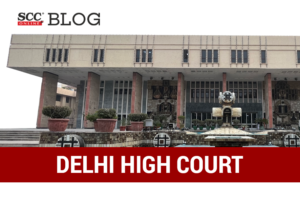Delhi High Court: In a case wherein a petition was filed under Article 226 of the Constitution of India r/w Section 482 of Criminal Procedure Code, 1973 to challenge the impugned order whereby the application for furlough was dismissed, a Single Judge Bench of Rajnish Bhatnagar, J. granted three weeks of furlough to the petitioner and observed that no rule had been pointed out by the State for such a situation where the furlough had been denied perennially, even with earning of last three annual good conduct report when the accused had jumped parole or furlough or committed a crime.
Background
It was submitted that the petitioner was denied furlough only because the petitioner did not surrender when he was released on parole in 2012. It was further submitted that the conduct of the petitioner in jail was good, and he was also awarded good conduct certificates by jail authorities. It was contended that the necessary requisite for granting furlough was three good conduct remissions which the petitioner had already earned and in fact, the petitioner had earned seven good conduct remissions even after his re-arrest. The petitioner was in judicial custody since 2000 and had undergone over 19 years in custody and had earned about four years of remission.
Counsel for the respondent opposed the present petition and submitted that during the period when the petitioner was released on parole, firstly, he jumped the parole and did not surrender and secondly, he committed an offence for which an FIR was registered under Sections 25, 54 and 59 of the Arms Act, 1959 and therefore, the petitioner was re-arrested. Moreover, another FIR was registered under Sections 34, 328 and 379 of Penal Code, 1860 against the petitioner while he was absconding parole, hence, it was submitted by the respondent that furlough could not be granted to the petitioner. It was also submitted that once a person jumps furlough or parole, he was never eligible for grant of furlough.
Analysis, Law, and Decision
The Court noted that the petitioner had not availed the benefit of furlough for the last eight years since 2015 and had undergone sentence for more than 23 years including remission. Moreover, the conduct of the petitioner was satisfactory, and he had earned seven good conduct remissions except that he jumped parole and was re-arrested in 2015.
The Court relied on Asfaq v. State of Rajasthan, (2017) 15 SCC 55, wherein the Supreme Court held that “not all people in prison were appropriate for grant of furlough or parole. Obviously, society must isolate those who show patterns of preying upon victims. Yet administrators ought to encourage those offenders who demonstrate a commitment to reconcile with society and whose behavior shows that they aspire to live as law-abiding citizens. Thus, parole programme should be used as a tool to shape such adjustments”.
The Court observed that “no rule had been pointed out by the State for such a situation where the furlough had been denied perennially, even with earning of last three annual good conduct report when the accused had jumped parole or furlough or committed a crime”. The Court further relied on Satender alias Gajender v. State (NCT of Delhi), W.P. (Crl) 221 of 2022 and Rajkumar alias Bhola v. State (NCT of Delhi), W.P. (Crl) 25 of 2023 and opined that the present case of the petitioner was suitable for granting furlough and thus, the Court allowed the petition and granted furlough for a period of three weeks to the petitioner.
[Manoj Kumar Singh v. State (NCT of Delhi), 2023 SCC OnLine Del 1164, decided on 21-2-2023]
Advocates who appeared in this case:
For the Petitioner: Advocate Akshay Bhandari;
Advocate Anmol Sachdeva;
For the Respondent: ASC Sanjeev Bhandari;
Advocate Kunal Mittal;
Advocate Saurabh Tanwar.
*Judgment authored by: Justice Rajnish Bhatnagar.

